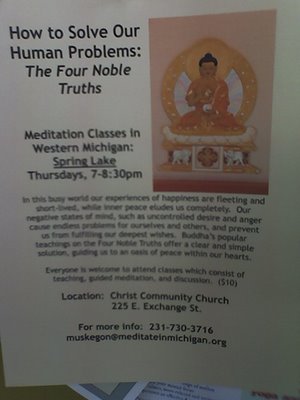Driscoll on the Chucks - (3) Hell and the Rapture
Driscoll's next point of commentary/analysis:
Hell. Again echoing McLaren and the Emergent folks, Smith Jr. says in his response video that he does not believe hell should be used for evangelism and such. While this sentiment may sound kind, it is not. Jesus spoke of hell more than anyone in the Bible and any effort to downplay eternal conscious torment of the unrepentant in hell is the first step in promoting false doctrine. Additionally, for those who are dying, the consideration of an eternity in hell is not only an effective means by which to compel them to repent of sin and trust in Jesus, but also a pastorally kind one because if they die apart from Jesus they will spend eternity in a fiery hell. It is more kind to offend them today and spare them that fate than to spare them today and send them to that fate.
Not much I can add here, except to lend a hearty "amen." This is one of the reasons I have come to really like Driscoll; at the end of the day, he is Biblically conservative.
Next point:
Rapture. The rapture, like the age of the earth, is an issue that Christians should discuss and debate, but not divide over. Years ago when I first read Smith Sr.s book Calvary Chapel Distinctives, I was surprised to see that in addition to the Holy Spirit, Bible, grace, Jesus, and love, which all make sense, the premillenial pretribulational rapture of the church was an essential doctrine. Curiously, the rapture is a doctrine that has existed for less than two hundred years in the church's history. The word itself started at a peculiar and possibly cultic charismatic prayer meeting where a women prophesied that the church would be raptured. From that simple beginning, the doctrine has now become the leading eschatological position in American evangelicalism. For more on this issue, the book The Incredible Cover Up: Exploring the Origins of Rapture Theories by Dave MacPherson is a fascinating historical read. Since the doctrine was not even heard of by men such as Athanasius, Augustine, Calvin, Luther, Zwingli, and Wesley, we should not make this doctrine the litmus test of biblical faithfulness, otherwise we are saying there was no faithful eschatology for the first 1,800 years of the church.
...and this is one of the reasons why, though I like Driscoll, I find myself having to disagree with him.
Before analyzing Driscoll's analysis, I must again point out that this is an "in-house" debate. This is an area over which we can vigorously disagree (and we do) and still remain brothers and maintain the bonds of peace and unity. That I maintain that Mark is wrong here is not the same thing as saying I think he's not a brother. Again: this is not an apologetics issue.
So, first off, and sort of as a "things that make you go hmmm" thing, note that Driscoll says, "The rapture, like the age of the earth, is an issue that Christians should discuss and debate, but not divide over." True; however, we're not "dividing" over this particular doctrine in the sense of breaking fellowship with those who are wrong. To be sure, Calvary Chapel has defined adherence to a hope in the pretribulational, soon return of Jesus for His Church as being part of that which defines us as a movement; but we do still think that at least one or two of those who get it wrong on this point may yet still make it to heaven (tongue-in-cheek alert, tongue-in-cheek alert). Later in the post he says, "Since the doctrine was not even heard of by men such as Athanasius, Augustine, Calvin, Luther, Zwingli, and Wesley, we should not make this doctrine the litmus test of biblical faithfulness, otherwise we are saying there was no faithful eschatology for the first 1,800 years of the church." I'll comment on the bulk of the statement later on; for right now, I want to focus on his assertion that "we should not make this doctrine the litmus test of biblical faithfulness..."
...okaaaaaaay...
Calvary Chapels don't use the Rapture as a litmus test of biblical faithfulness - at least, not in the way that Driscoll's implying here (that is, of drawing that proverbial line in the sand and saying, "if you're on that side, you're nothing but a filthy rotten heretical ninny!"). We do unapologetically say that we adhere to it, and that such adherence is a sine non qua of our movement. If you disagree, we love you, we can interact as brothers and gain much from each other... but you'd be much more comfortable in another movement which doesn't hold to this doctrine as a distinctive. No harm, no foul. I mean, you're wrong, but we still love you. (...do I really need to flash the tongue-in-cheek alert again...?)
It is fascinating, however, to note Driscoll's glaring inconsistency here. Driscoll's church puts Calvinism, and his Acts 29 church planting netowrk puts elder-led church polity, and the like in their Statement of Faith - defining these things as being their distinctives, foundational to who and what they are.
At John Piper's recent Desiring God convention, Driscoll delivered a session in which he delineated nine "non-negotiables" of the faith:
- The Bible
- The sovereignty of God
- The virgin birth of Jesus Christ
- We must argue against Pelagianism, a denial of original sin
- We must contend for penal substitutionary atonement
- The exclusivity of Jesus
- We must contend for male and female roles
- We must contend for hell
- We must contend that kingdom is priority over culture.
Not a bad list, but as a non-Calvinist, I have certain problems with it. I don't see God's sovereignty in quite the same fatalistic/deterministic sense that he does... and though I confess to not having yet listened to Mark's session (though I fully intend to) I cannot help but wonder whether or not his stance on "Pelagianism" is really a poorly veiled attack on Arminianism - which is not the same thing, Calvinist calumny aside. (Okay, I just finished listening to his session at the conference, and I must say, it was for the most part quite good... but he did, in keeping with his ingrained Calvinism, make continual reference to Arminianism, equating it with semi-Pelagianism, which totally cheeses me off, but is the subject of another post... Also spared few words denigrating dispensationalism... so my point in this paragraph stands.) I'm not a Calvinist, and I'm not an Arminain, either; but he'd almost certainly consider me one, given that I reject things like limited atonement and double-predestination. So... am I "off the list" as far as not meeting "the litmus test of biblical faithfulness...?"
...why is Driscoll and Mars Hill allowed to delineate their distinctives, but we aren't, I wonder?
...pot... kettle... black...
Like I said, "things that make you go, hmmmmmm..."
Now, regarding Driscoll's redredging up of the common nondispensationalist contumely that the doctrine of the Rapture is a recent development by some chick in England and is really an elaborate plot... blah, blah, blah... and that Dave MacPherson did a bang-up job in shattering its myth... ::yawn:: MacPherson's scholarship is occluded by his loathing of dispensationalism, and his fact-checking is a bit... wanting. There are many great, shcolarly dispensationalist responses to MacPherson & others... but for a simple, short, easy-to-understand treatment of the more glaring problems with his entertainingly flawed hypotheses, check out this article.
Did dispensationalism only erupt on the world stage in the "last two hundred years," as Driscoll asserts?
Well, my first question would be, even if that were true (which it ain't), "What possible difference would that make?"
Driscoll's a Calvinist, for crying out loud! Calvinism has only been around since - what - the 1600's? Okay, so it's got 200 years on Darby. Yippie. And yes, I know that many Calvinists argue that they're really Augustinians... fine; I personally like going back a wee tad farther to - oh, say, the New Testament. For me, the question isn't, "did the church fathers believe x, y, or z," but rather, "what did the Holy Spirit originally say?" Church history is a history of compromise and failure and continual restoration due to that failure. Driscoll's own Reformed tradition exists precisely because certain doctrines had been lost to the church, and needed to be restored. Driscoll's also friendly to the gifts of the Spirit - something which is also a recent development in church history (as the expression of the gifts is currently understood). He has no problem with that - even though his more cessationist brethren would use the same argument against the gifts as he tries here against the Rapture (the gifts weren't practiced like that in the 1800 years before Azusa Street, etc.). We could go on.
An appeal to authority only works if that authority is, in fact, authoritative. Or, in the context of Driscoll's argument, an appeal to history is only valid if history is considered authoritative.
Now, before you go and get all freaked out on me, let me point out that I'm not advocating historical isolationism or a minimalist/reductionist view of history. The fool ignores that which has gone before.
The fool also places that which has gone before on too high a pedestal. And interpreting Scripture through the lens of church history rather than church history through the lens of Scripture places history at minimum on par with it. The strongest arguments that Catholics and Eastern Churchmen have revolve around this very appeal.
Besides, the argument that nobody prior to about the 1800's is... well, to be charitable, I'll call it inaccurate.
- Check out this article on Ephraem the Syrian
- this article about the early church fathers' views on immanency
- this article which, interestingly enough concerning the issue of Driscoll's enamorment with Ladd's eschatology - but specifically in relation to the early fathers' views concerning the distinction between Israel and the Church - a key element of dispensational thought
- this article dealing with pre-Darby (and by extension, pre-MacDonald) Rapture statements
- this article concerning the post-apostolic fathers and premillennialism - another key element of dispensational thought
- and on...
- ...and on...
- ...and on.
I'd formally like to recommend Koinonia House, the Pre-Trib Research Center, and these articles, among a plethora of other resources, for "from the horse's mouth" perspectives on dispensationalism, rather than the weak caricature that we usually read from those who don't much care for the doctrinal perspective.
But, bottom-line, the issue boils down to, "what does the Bible say?" This is not the place for an in-depth Bible study, so I won't go there here. Driscoll & co. state in the Acts 29 Network's statement of beliefs that, "We are not eschatological Theonomists or Classic Dispensationalists (e.g. Scofield) and believe that divisive and dogmatic certainty surrounding particular details of Jesus Second Coming are unprofitable speculation, because the timing and exact details of His return are unclear to us." I thoroughly disagree - and a quick reading of the relevant section in the Distinctives gives a pretty good theological argument for the Blessed Hope that lends the lie to Mark's assertion. I won't waste blogspace recreating the arguments here.
So, to recap: Driscoll states that Calvary Chapel (in essence) has made the Rapture an "essential doctrine." ...yes and no. "Essential" in respect to being a Calvary Chapel, but not in respect to what Driscoll means, in respect to being Christian. Driscoll states that the Rapture is a recent innovation. Yeah, ah... no.
Soooooooo... on to the next point, when I can scare up time for that...
 Okay, total stream-of-consciousness time here... I'm watching the
Okay, total stream-of-consciousness time here... I'm watching the 
















